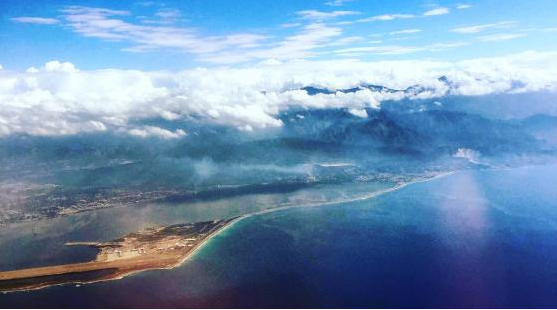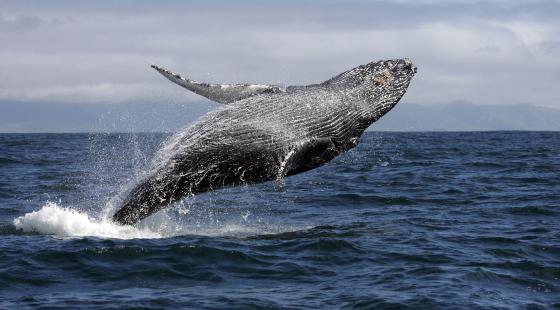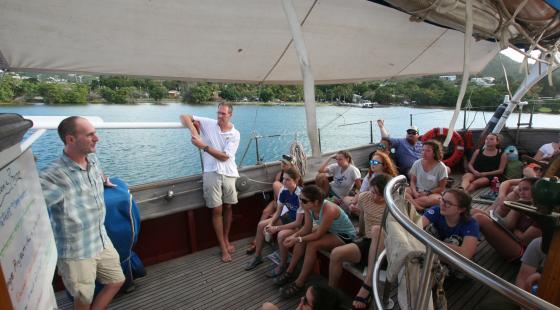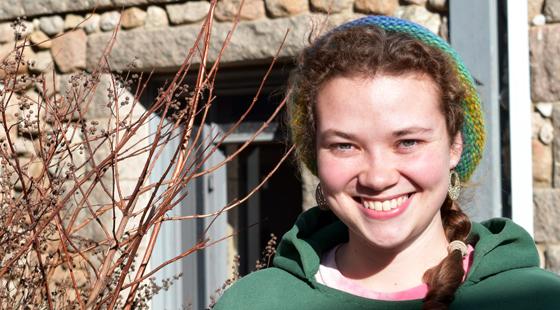
Farewell Caribbean
Inspiration and Final Update from our Onboard Reporter!
Aiden Ford is Sailors for the Sea’s Onboard Reporter for the spring 2016 semester while she is studying aboard Sea Education Association’s tall ship Corwith Cramer.
As I flew above Jamaica on my way home, I used the time to reflect on my experience and my learning in the Caribbean. Many memories and images came to my mind: times sorting out the plastic from the marine biology caught in our nets, sighting plastic bags off the quarter deck of the Cramer, counting plastic bottles and pieces of foam on the beach, wondering if sea glass was waste, thinking of the millions of unseeable runoff molecules and microplastic bits that race to the ocean with every rain shower, and hearing from residents of the islands, some of whom cared deeply about conserving the environment, some whom could not care less.
Overall, I saw what I expected to see: work being done to fix the issue of marine pollution, but a long way still to go. In order to have oceans free of marine debris, we need to go further than simply all doing our part. It is absolutely helpful to ocean health to not throw your post consumer waste into the ocean. However, your neighbor may be discarding twice as much waste as you, and they may not be as knowledgeable as you are as to where they should put their waste. Further, it is all well and good to put your garbage into a trash can instead of overboard, but where is that trash bag going to go next? To a landfill, that may get heavy rainfall, which will sweep away your waste and deposit it into the very place you made extra efforts to keep it out of? To an incinerator, where your trash is put into the atmosphere and then rained down onto the ocean, adding to its raising ph levels?
In order for any change to be made, we must first think. Think about what you choose to purchase in the grocery store. What packaging does it come in? Where is that packaging going to end up? Where was the product grown? On a farm that overfertilizes in order to meet the demands of today’s market, but subsequently pollutes the oceans further in the process? We as consumers can choose what to promote. We as sailors should choose better, if for no other reason than to save the sick ocean on which we adventure. After seeing first hand that my choices as a consumer affects the health of the ocean directly, I realised that I can make a difference. So, I made a promise to the blue lady below my plane. I promised to find ways of traveling that reduced the carbon introduced to her waters. I promised to be aware of all the journeys that the products in my shopping cart have taken to get to me. I promised to choose carefully where I put my post consumer waste. And lastly, I promised to make sure my friends and family know to be aware of their actions too.
And maybe, by the time I’m old and grey, I will sail on an ocean where marine debris is an anomaly.
Learn how Aiden’s adventure began >>
In collaboration with Sea Education Association (SEA), Sailors for the Sea is offering an award for a SEA Semester student to become an Onboard Reporter. SEA is an internationally recognized leader in undergraduate ocean education through their study abroad program. As a recipient of the new Sailors for the Sea Onboard Reporter award, Aiden Ford is chronicling ocean health issues observed during her voyage aboard the SSV Corwith Cramer, one of SEA’s tall sailing ship research vessels. Aiden is a College of the Atlantic student currently studying off campus with SEA Semester’s Colonization to Conservation in the Caribbean program in spring term 2016. This program gives undergraduates of all majors the opportunity to investigate and compare sustainability issues across several multifaceted Caribbean islands, including Cuba.




